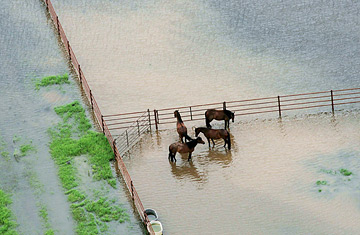
Horses stand in a flooded pasture near Lake Granbury as heavy rains moved through Central and North Texas.
The rain came in such abundance that cable news anchors and soggy correspondents in the field were compelled to call it "biblical" and, for those of us living in Texas, it is beginning to feel like Old Testament times. For the last few weeks a stalled low pressure system, trapped by two ridges of high pressure, has hung over Texas producing day after day of rain, as much as 11 inches in three hours just northwest of Austin.
Texas is now a state of urban dwellers and many are newcomers who have no cultural memory of the cycle of drought and abundance that rules here. In fact, last year, a survey of Central Texans found most didn't know where their water came from. Most of us simply think of the Highland Lakes as a recreational resource. But the necklace of man-made lakes that control the Colorado River were built in the 1930s to harness deadly floodwaters and provide water and electricity to the region.
There was much grumbling last summer amid what turned out to be a two year drought as water levels fell and boats were high and dry dockside. Now boats torn from their moorings are tumbling through dam spillways and local television reporters are standing in lakeside parks knee deep in water pointing out the picnic tables floating by. The 20 inch rain deficit in the hills to the west of Austin was wiped out in one night as weather radar showed a large purple blob stuck over Marble Falls, Texas.
This type of weather always brings tragedy — cars swept away, traffic accidents, flooded homes — but out in the hills it also brings abundance. Ranchers won't be burning the spines off cactus this year to provide food for grazing cattle. The deer population, savaged last year as starving does aborted their fawns, likely will see a baby boom marked by twin births, common in green years. "It's amazing," Robert Perez, a state wildlife biologist told the Houston Chronicle. "I've been around the state over the past several weeks, and it's like a new world. Everything's green. There's grass everywhere. And there's so much life out there — not just game animals but everything. I was up in the Rolling Plains the past couple of weeks, and I've never seen so many snakes and frogs and lizards and mosquitoes!"
Even we urban dwellers have seen the signs. Neighbor kids gathered around a big live oak to watch a large rat snake hanging in the branches — rat snakes are a "good thing," one neighbor, a native Texan, assures everyone as the grownups shudder. Mosquitoes don't wait for dusk to come out and refilling the backyard bird feeder is like a trek in the Amazonian jungle, no need this year to keep the birdbath filled.
The rains are also good news for the rice farmers downstream. Across the state, peanuts, pumpkins, peaches, berries, cotton crops, corn, watermelons, are all flourishing, according to the Texas Cooperative Extension service. Good news that is only heard during the ag report on the rural radio stations, while we city dwellers simply complain about having to mow the lawn twice a week and wear insect repellent to collect the mail.
But look beyond the lawn mower and there are signs of abundance that even the most jaded urbanite can decipher. The garden hoses hang limply on the wall, the rose bushes don't need constant coddling, the basil plant is big as a bush, and the potted fern is threatening to block the path to the front door. Everything is green, not gold this summer, except for the bag of plump, ripe tomatoes delivered by a neighor. Tomato vines love the rain. "It may well be a tomato year — a happy thought," writes Austin organic farmer Carol Ann Sayles from Boggy Creek Farm in her weekly email to customers. "We do love them. Guess I'll have a tomato sandwich tonight. And for lunch tomorrow, and on and on."
And when all the tomatoes are gone from the big bowl on the kitchen counter, we will have the butternut squash — at least I think it is butternut squash growing on a 15 foot vine that spontaneously erupted from our compost heap. I remember tossing skins and seeds there last fall after baking a squash casserole on a cold, cold, dry day.
